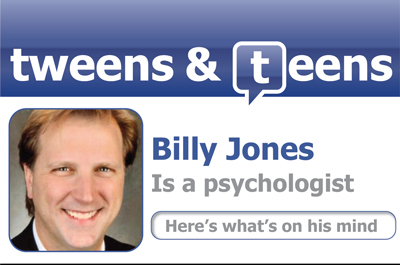
“Don’t walk in front of me; I may not follow. Don’t walk behind me; I may not lead. Just walk beside me and be my friend.” ~ Albert Camus
Hello all and welcome to the January edition of…drum roll, please, Teens and Tweens!
I had a question posed to me not too long ago and thought I’d take this opportunity to respond. Here’s the question:
“My tween daughter and her BFF (that is best friend forever for you not-so-geeky people) had some kind of problem a few weeks ago and they haven’t been speaking to each other ever since. My daughter is SO upset about it but won’t tell me many of the details about what caused the argument. She says that she doesn’t want to talk about it.”
“At what point do I get involved? I don’t want to meddle too much in her friendships, but she seems so depressed lately and I’m not sure what to do. Is this one of those hard lessons I let her get through on her own, or should I call her former friend’s  mom and try to broker a peace agreement?”
mom and try to broker a peace agreement?”
Oh boy, where to start? How about the beginning…
In most parent-child relationships, the adult typically has the power and authority over the child. BUT, in peer relationships, this is not the case. Power and authority must be negotiated (please don’t take those terms to mean dominating, bullying, abusive, etc.). It simply means they’re learning who does most of the talking and who seems to make most of the decisions, etc. That’s why some teens lead and others follow…the negotiating process is being established. These patterns, by the way, become more ingrained as we get older and leaders often remain leaders while followers often remain…well, followers.
We must also understand the difference between two terms which may sound alike, but are not. They are: peer interactions and peer relationships. Peer interactions consist of behaviors such as verbal exchanges, chit-chat, etc., while a peer relationship suggests that the teen will consistently seek out the same person to have continued interactions over time.
As such, the emergence of a “true” friendship becomes apparent when 4 things occur. They are: (1) Tweens/teens (and adults) consistently seek out each other’s company, (2) They show some level of distress when the other is not present, (3) They discuss positive features and feelings about each other, and (4) They adjust their own behaviors to help meet the needs of the other.
As people become friends and interactions with each other increase, there will inevitably be conflict. Think about the first year of your marriage and how disagreements occurred. “He will not put the toilet seat down” is what I always heard. To which I responded, “She won’t leave the toilet seat up…enough said on that matter as I really don’t want to sleep on the couch and, yes, my wife does read these articles. Though, to be honest, the seat could just as easily stay up as it could down. Can I get a big testosterone high five from some of the men reading this article?
Okay, where was I?
As disagreements occur, then people must problem-solve the situation. This is a part of the negotiation process mentioned earlier. It’s also #4 on the list above of the features found in a true friendship (i.e., adjust their own behaviors to help meet the needs of the other). Assuming the tween/teen knows how to problem-solve, they will usually work things out for themselves without your help. Or, they may part ways if this cannot happen. As we grow older, our thoughts, feelings, and interests change. As they change, we typically become friends with people who are, at least partly, the same as us.
As parents, though, you should always be there to listen. Giving advice would be perceived as lecturing, which is a definite No-No. I often say to my children, “If you need me to listen, I’m there for you. If you want to ask a question, I will do my best to answer it. But, no matter what, I am always there to support and love you.”
On occasion, my oldest son will actually ask a question. It is at that point, I typically respond, “Do you want me to lie and make you feel good, or do you want me to tell you the truth?” He always says, “Tell me the truth” and then I’m free to do so. Many times he is right, or he has played a good football game, etc. For the times when he’s wrong, or has not had a good game, I tell him the truth. I’m nice when I do so but also honest. “You really sucked and cost the team the game” is NOT the way to go. I have, however, said on more than one occasion, “You did not play well today, but don’t worry, that’s why we practice.” Or, “I think your friend is the one who’s right because…”
So, to sum this up: When should you get involved? Immediately. This is done by telling them that you are there when they are ready to talk.
When should you butt in and let it all out? Only if there’s a real danger to themselves or others.
That means that MOST of the time, you’re doing the former and letting them know that you’re there TO LISTEN whenever they would like to talk. If they have any questions, you’ll do your best to help answer. And always let them know how much you love and support them.
I just thought of one more thing…telling them some of your past mistakes is not so bad and can let them know that they are not the only one who has had that type of problem. I should add that I would only do this when your past mistake is similar to their situation and it does not involve something too personal. For example, “I remember in high school when I made out with the prom queen in the middle of the football field…SCORE!” is not something I would share. Use your best judgment and you should be fine.
Take care, and I’ll see you next month.
billy
Click here to read previous articles on Tweens & Teens. Got a question for Dr. Jones, a child psychologist for Mercy Health? Send it to us (we won’t use your name) and we may feature it in an upcoming installment of Tweens & Teens.






